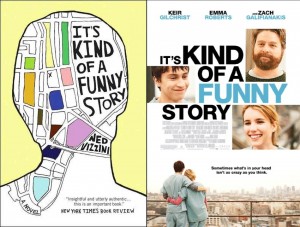(Note: I wrote the following before author Ned Vizzini took his own life. This is the only Vizzini book I’ve read, and it’s a great one. His death is particularly sad given the topic of the book — struggling with depression and suicidal thoughts.)
I’m including the book and the movie in the same entry — something that I generally won’t repeat in future entries. But here, I saw the movie and read the book within a month of each other, so they’re very linked in my brain.
Funny Story is a dramedy about Craig’s (Keir Gilchrist) brief visit to a psych ward when he wakes up one morning feeling depressed, borderline suicidal. Once admitted to psych ward, he encounters headcases of various degrees — from the slightly unstable Bobby (Zach Galifianakis) to the severely sick Muqtada.
And then there’s the mysterious wrist-cutter Noelle (Emma Roberts) with whom Craig strikes up a tenuous friendship that blossoms into a romance.
Along the way, Craig witnesses the destructive power of societal expectations and emotional hesitancy. The ending is a little bit too “happily ever after,” but the story provides some thoughtful commentary on the different ways people respond to a high-pressure lifestyle and feeling “broken.”
The main narrative difference between the book and the film is that the film basically drops the first third of the book — a decision that works well, as the beginning of the book, where Craig gradually loses control of his life, is a bit dull and overlong.
The film simplifies the story a bit but rewards people who’ve read the book with some hidden allusions to the book. There are a few scenes in the film which are really magical and fun to watch. My favorite scene is a fantasy sequence that comes out of nowhere in which Craig sings “Under Pressure” at a group therapy session. Plus, the movie has Galifianakis’s finely-tuned performance in its favor. He makes the movie worth a watch by itself.
It’s no masterpiece, but It’s Kind of a Funny Story — both the book and the film — connected with me as an engaging blend of humor, pathos, and relevant comedy about self-destructive tendencies.





